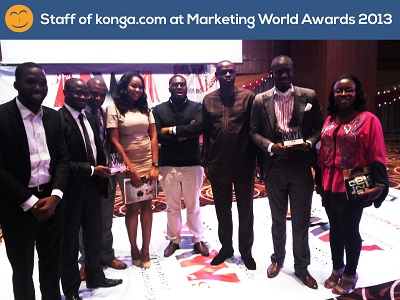News
Creativity Dies as Archaic Laws Hinder Anti-Piracy War

The fight against Intellectual Property (IP) theft in Nigeria is hampered by outdated laws which do not take into consideration modern achievements in science, technology and general advancement in human creativity and their inherent challenges, Nigeria CommunicationsWeek has learnt.
Nigeria loses over N10 billion annually due to non-protection of intellectual property and is a drain on creative minds.
Akeem Aponmade, a legal counsel and intellectual property, said IP right infringement is clear and present danger that must be addressed to encourage Nigerians to exhibit their talents.
Intellectual property (IP) according to the World Intellectual Property Organisation (WIPO) refers to creations of the mind: inventions, literary and artistic works, and symbols, names, images, and designs used in commerce.
But stealing of these creation is easy and widespread, no thanks to lack of laws that can keep pace with the rapid growing knowledge era.
Aponmade said that the various laws need to be reviewed while statutes on plant breeders’ rights as well as proprietary information should be enacted to bring the country’s laws up to date with modern achievements in science, technology and general advancement in human creativity and the serious challenges they have thrown up.
Nigeria CommunicationWeek gathered that stealing of intellectual property can cost people their jobs, damage the reputation of the original maker of the counterfeited product, cause sickness and bodily harm, deprive governments of desperately needed tax revenue, and even result in the spread of organized crime and gangs—which in turn can damage more lives and destroy neighborhoods.
The Business Software Alliance (BSA) reported in the ninth-annual BSA Global Software Piracy Study that well over half of the world’s personal computer users (57 per cent) were pirated software.
The BSA is a professional governing body which has come together to eradicate illegal use of licenses around the globe and conducts studies all over the world.
The commercial value of all these pirated software climbed from $58.8 billion in 2010 to $63.4 billion in 2011, a new record, propelled by PC shipments to emerging economies where piracy rates are highest, including Nigeria.
Latest piracy research for Nigeria indicated that the value of software theft in the country reached a new peak at $225m in 2010, as 83 per cent of software deployed on PCs during the year was said to be pirated, according to Microsoft Nigeria.
Aponmade counseled that IP protection must be put on the front burner of the government.
He also urged the government to complete a comprehensive review of all relevant IP legislation as a matter of urgent importance.
“We cannot continue using laws made several decades ago to fight IP theft in 2012, especially where some of the types of the stealing occurring now were never envisaged by the draftsmen,” he added.
News
Experts Caution e-commerce Operators on Eco-friendly Materials

Experts have urged the Nigerian e-commerce industry to use eco-friendly materials in its packaging and logistics of products to reduce carbon emissions and protect the environment.

The experts made this known at a sensitisation workshop on Greening E-commerce orgainsed by The Sustainable and Inclusive Economic Development for Decent Employment In Nigeria Programme (SEDIN) – an initiative of the German Development Agency (GIZ) in partnership with Nigerian Postal Services (NIPOST).
The experts stressed the importance of e-commerce operators in Nigeria committing to concrete climate actions and sustainable operations.
Nnaemeka Ngwu, director of the public sector initiative and a professor at Lagos Business School, urged e-commerce companies to quickly adopt sustainable green technology to minimize their environmental harm.
“E-commerce is a business enabler and a platform through which many people can get involved in trade and commerce. However, e-commerce also brings lots of issues in sustainability and climate change because of pollution,” he said.
According to him, to improve the sustainability component of e-commerce, the country must promote better packaging and logistics among operators.
“We need to green the e-commerce industry to make it more inclusive and support the climate so that it does not cause risks and issues,” he explained.
He commended the Lagos State government on the ban on single-use plastics, calling for the policy to be complemented with awareness, advocacy, and engagement so that the public understands the reason for the policy.
He noted that such awareness should be done regularly, while urging the Nigerian Postal Service to use its leadership role in the courier industry to engage other courier businesses within the space on the benefits of sustainability and the packaging and logistics issues.
In her opening remarks, Titi Oshodi, special adviser to the Lagos State Governor on Climate Change and Circular Economy, called for awareness on greening across various sectors of governance, communities and the private sector
“This will ensure that people understand the rationale behind the policies on greening and they also understand what the alternatives are,” she noted.
“This is the reason why climate literacy is a front-boner strategy for us in Lagos State,” she added.
She explained that Lagos is a commercial hub that grew its GDP due to the operations of micro, small and medium-size businesses. “We need to have them empowered, more knowledgeable about sustainability practices.”
Tola Odeyemi, postmaster-general, Nigerian Postal Services (NIPOST), said the courier can play a strategic and vital role in greening the ecosystem, noting that it has 1,174 post offices nationwide.
Odeyemi, who was represented by Ernest Mamood, general-manager of EMS Parcel Nigeria, said NIPOST is a regulator in the country’s courier industry and can use its position to sensitize other operators in the industry on the use of eco-friendly materials in packaging and logistics to cut environmental impact.
News
Tech Alliance Aims to Transform Africa’s Mapping System

Space42, the UAE-based global AI-powered space-tech company, part of technology group G42, this week announced the signing of a memorandum of understanding with Microsoft and Esri to deliver high-resolution, scalable base maps across all 54 African countries, serving over 1.4 billion people.

Known as the “Map Africa Initiative,” the project will create a comprehensive base map of the continent to date, addressing challenges in infrastructure, investment, and institutional gaps, according to Space24.
The company said the updated mapping system will catalyse economic development through increased access to intelligent solutions that support governments, businesses, and communities.
The five-year collaboration aims to strengthen geospatial capabilities across Africa and the UAE, and provide precise and accessible data to national and regional stakeholders.
Space 24 detailed how the initiative will enable economic opportunities and innovation, saying the program is expected to unlock long-term value across multiple industries including: ports and logistics; renewable energy; security and disaster response; smart cities and digital economies.
It added: “Accurate maps are foundational to urban planning, public services, and technology deployment. The data will be licensed to national governments, enabling ownership and long-term updating by National Mapping Agencies. Over time, the initiative will also support a new commercial ecosystem of African startups. The data will eventually be housed in G42 and Microsoft-managed data centers across the continent.”
Hasan Al Hosani, CEO of Smart Solutions at Space42, said: “Partnership is core to the UAE’s DNA, and is central to how Space42 operates. This collaboration with Microsoft and Esri is more than technical; it’s strategic. It advances Space42’s business priorities, strengthens our role as a trusted partner to governments, and delivers meaningful benefits to communities across Africa.
“Accurate, high-quality mapping and the intelligence solutions built on it are essential for growth, resilience, and inclusive innovation. With reliable data, communities and economies prosper.”
While, Jack Dangermond, president of Esri added: “We are proud to support the Map Africa Initiative in partnership with Space42. Transforming satellite imagery into detailed, accurate base maps at continental scale requires advanced geospatial technology and professional production workflows.
“These same capabilities have supported similar national and regional mapping efforts around the world. With Map Africa, we are helping to establish a foundational resource that will drive infrastructure planning, economic growth, and sustainable development across the continent.”
News
Kenya Tops Global Rankings for ChatGPT Use

Kenya has emerged as the global leader in the adoption of ChatGPT, with a higher percentage of its internet users utilizing the AI chatbot than any other country.

According to the July 2025 Global Digital Report from DataReportal and Meltwater, an astounding 42.1% of Kenyan internet users aged 16 and above used ChatGPT in the past month.
This remarkable statistic places Kenya at the forefront of a global shift towards integrating artificial intelligence into daily life, outranking traditionally tech-forward nations such as the United Arab Emirates (42%), Israel (41.4%), Malaysia (39.8%), and Brazil (39.7%). In contrast, major economies like Russia (10.8%), China (7.3%), and Japan (5.8%) showed significantly lower adoption rates.
The report, which provides a comprehensive snapshot of digital trends worldwide, also highlights Kenya’s significant contribution to the platform’s overall traffic. The country is ranked third globally in website traffic to ChatGPT, accounting for 4.81% of all global visits, trailing only the United States and India.
Analysts attribute Kenya’s rapid and widespread adoption of ChatGPT to two primary factors:
- A Young, Tech-Savvy Population: With a median age of just 20, Kenya has one of the youngest populations in the world. This demographic is highly digitally native and has been quick to explore and adopt AI tools for a wide range of purposes, including education, business operations, and content creation.
- High Mobile Internet Penetration: Over 48% of Kenya’s population uses the internet regularly, with the vast majority accessing it via mobile devices. The accessibility of AI tools like ChatGPT on smartphones has been a critical enabler of its adoption, even in semi-urban and rural areas.
The report’s findings come shortly after OpenAI, the creator of ChatGPT, revealed that the platform now handles over 2.5 billion prompts globally every day. While OpenAI did not provide a breakdown of these prompts by use case, the platform’s popularity for tasks ranging from writing and coding to research and brainstorming is undeniable.
Kenya’s top ranking is a powerful indicator of the country’s dynamic and fast-evolving digital landscape, showcasing an eagerness to embrace cutting-edge technologies and positioning the nation as a key player in the future of AI adoption in Africa.

 Telecom2 days ago
Telecom2 days agoHistory as MTN Nigeria Becomes First to Hit ₦10 Trillion Market Cap @ NGX

 Telecom2 days ago
Telecom2 days agoMTN Nigeria’s CAPEX Soars Nearly 300 Percent to ₦565.7Bn in Q1 2025

 Telecom2 days ago
Telecom2 days agoMTN Nigeria Celebrates Super Falcons with ₦150 Million Reward After WAFCON Triumph

 General News2 days ago
General News2 days agoNigeria Sends Egusi, Others to Space @ NASA’s Crew-11 Mission Launch

 Telecom2 days ago
Telecom2 days agoVitel Wireless Rolls Out 50,000 SIM Cards, eSIMs

 General News2 days ago
General News2 days agoNITDA DG says Nigeria’s Digital Economy Will Empower Citizens, Bridge Divides, and Drive Unity

 General News2 days ago
General News2 days agoAfDB Approves $46m to Transform Healthcare in Sokoto State

 News2 days ago
News2 days agoExperts Caution e-commerce Operators on Eco-friendly Materials














